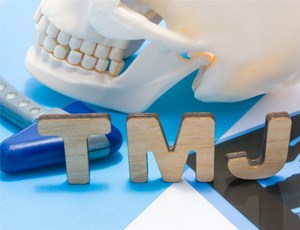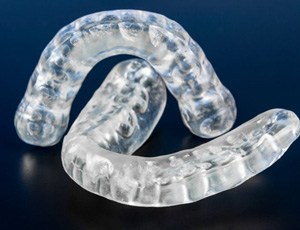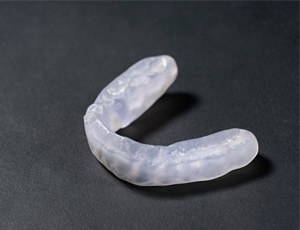TMJ Treatment – Richardson, TX
A Long-Lasting & Reliable Way to Relieve Jaw Discomfort
Have you been struggling with pain in the jaw, sore facial muscles, or other symptoms that make it troublesome to perform daily oral habits? If you're having complications with eating your meals or simply opening your mouth without discomfort, then you’ll want to consider visiting our team at Canyon Creek Family Dentistry of Richardson for TMJ treatment. With our customized services, we can help alleviate your situation so that you can regain a healthier and more comfortable smile! Keep reading to learn more about TMJ treatment or give us a call to schedule a consultation.
Why Choose Canyon Creek Family Dentistry of Richardson for TMJ Treatment?
- Personalized Occlusal Splints
- Dentists with Decades of Combined Experience
- Professional & Caring Dental Team
What is TMJ Disorder?

TMJ disorder, otherwise referred to as TMJ dysfunction or TMD, is a condition that negatively affects your temporomandibular joint—the joint that connects your bottom jaw to your skull. TMD typically occurs whenever your TMJ starts to get overly stressed, injured, or overworked. This can be caused by several factors, including teeth grinding, accidental injury, or even a misaligned bite. Sometimes the root of the issue might be unknown, and that’s where our team can help.
Symptoms of TMJ Disorder

There is typically a wide range of symptoms caused by TMD, the most common involving:
- Limited jaw movement (or the inability to move the jaw altogether)
- Clicking and popping when opening or closing the mouth
- Soreness and pain in the jaw and the surrounding facial muscles
- Trouble chewing tougher foods
- Regular headaches or migraines
- Obvious changes in your bite
- Ringing in the ears (tinnitus)
- Discomfort behind the eyes
Types of TMJ Treatment

During your initial consultation, our team will thoroughly evaluate your oral health, jawbone structure, and bite to determine the root cause of your TMD symptoms. In certain instances, people might require orthodontic treatment to straighten their smile and correct their alignment pattern. Other methods might include a personalized occlusal splint or nightguards in combination with jaw exercises to promote long-lasting pain relief.
Occlusal Splint

This is a small device that appears exactly like a mouthguard, but it is specifically designed to help relieve pressure off your TMJ. By wearing this, you’ll allow your joint to recover more effectively. This device can also keep your teeth safe from grinding as well as lessen the chance of TMD-related headaches, that way you can return to living pain-free.
Nightguards

While nightguards are typically reserved for patients struggling with bruxism, they can also be used to help alleviate TMJ disorder. These thin oral appliances provide a protective barrier between your upper and lower arches, preventing them from accidentally damaging each other. We can also construct your nightguards so that they help realign your jaw while you rest, giving your TMJ a chance to heal properly.
TMJ Treatment FAQs
How much do you know about TMJ disorder? Do you fully understand your options for treatment? Please let us know if you have any TMJ-related questions. We love having the opportunity to educate our patients when it comes to the care they receive! If you read below, you will find a list of several questions that past patients have asked us; check the answers we’ve provided to see if they clear up your own concerns about your upcoming treatment.
Is TMJ Treatment Safe?
At our office, your TMJ treatment will be performed by a trained professional who will always keep your specific needs in mind. When you receive an occlusal splint or a nightguard, it will be very carefully tailor-made just for you. As such, the process can be considered completely safe.
It should be noted that TMJ disorder can be treated surgically in specific circumstances. However, any type of surgery comes with a certain level of risk. For this reason, it’s definitely worth pursuing occlusal splints and other minimally invasive treatment methods first before you start considering a surgical approach.
How Long Does It Take for an Occlusal Splint to Work?
In order to get the best results from an occlusal splint, you will need to wear it on a nightly basis for a matter of months. Your symptoms will often be notably reduced after six weeks, but about three to six months are usually required to achieve full relief.
The times given above are estimates. Every patient is different, and the treatment could take longer for some people than others. We can discuss what the timeline for your TMJ treatment is likely to be during your initial consultation.
Can TMJ Disorder Be Cured Permanently?
It is possible to cure TMJ disorder for good. In fact, it’s not unheard of for the pain to go away by itself in some cases. There are multiple forms of TMJ therapy available, some of which offer more permanent relief than others. As far as occlusal splints and nightguards are concerned, they offer long-term relief by correcting the jaw alignment problems that might be putting pressure on your jaw joints.
Is TMJ Treatment Covered by Insurance?
This may seem like a simple question, but the answer can vary quite a bit from patient to patient. Some insurance companies elect not to offer coverage for TMJ treatments at all if they don’t need to. Others will pay for such services but might put a limit on the coverage offered. They may also choose to only cover the cost of certain kinds of TMJ treatments.
Dental insurance and medical insurance can both potentially be used to help pay for TMJ treatment. The type of insurance that’s used in your case will often depend on what caused the problem as well as how severe your particular issue is.
